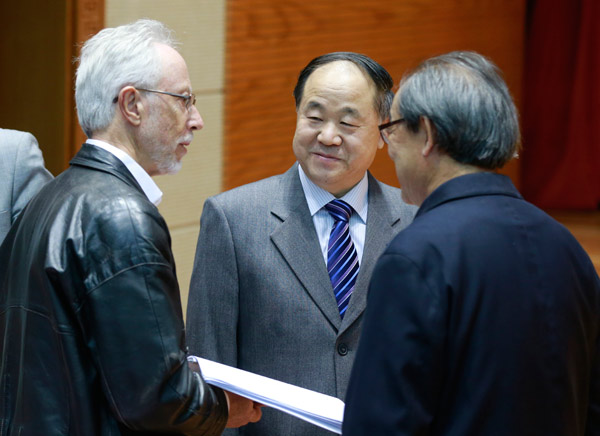Mo Yan says award led to mood swings
Updated: 2013-04-03 07:19
By Mei Jia (China Daily)
|
|||||||||||
 |
|
J.M. Coetzee (left), Nobel laureate in literature in 2003, Chinese writer Mo Yan (center) and Chinese translator Li Yao talk on Tuesday at the Second China-Australia Literary Forum held in Beijing. FENG YONGBIN / CHINA DAILY |
The two laureates were brought together by the Second China-Australia Literary Forum in Beijing, which kicked off on Tuesday and will conclude Wednesday.
Mo, the first Nobel winner in literature born and living in China, said he had trouble with the sudden publicity, which put a lot of pressure on him.
"I only hope to return to my writing desk as soon as possible," Mo said, "and I would also like to do good in society anonymously."
Mo said he was even bothered by numerous requests asking him to offer help that took advantage of his fame.
"I was upset the first several days after the prize announcement, but then I realized the prize is just like a mirror that reflects various attitudes about my winning, and more, reflects the real me," Mo said.
"I still consider myself an ordinary citizen who writes. And presenting quality works is my duty and best way of giving back to society."
"I'm no superstar," he emphasized several times.
Mo believes Chinese literature has achieved much in the past three decades, and the driving force behind that is not the prize.
"Writers' creations should not be driven by awards, or criticism, or readers' expectations," Mo said.
"Good literary pieces are always centered on people and human emotions," he said.
Coetzee discussed his own views on the Nobel Prize. Coetzee spoke of the literary tastes of Alfred Nobel, founder of the prize, and pointed out Nobel's personal preference that literary works show "progress and power of the human spirit", which could be an influence on the Swedish Academy's choices.
Mo said he misunderstood the standards of the academy's selection before he visited Stockholm to receive the prize in December.
"I thought they were judging the authors' personality or political features, then I learned the sole standard of their selection is literature itself, which is also deeply based in the Swedish people's long-established practice of reading a large number of books," Mo said.
During the forum, established Chinese and Australian writers discussed subjects as diverse as tradition and modernity, the local and the universe and cultural inclusiveness. And they will also read works to each other and the readers.
"Both China and Australia are countries with a great literary tradition in the Asia-Pacific region," said Tie Ning, chairwoman of the Chinese Writers Association, the forum's organizer, "I hope the mutual exchange will help people see the changing country and its various literary expression."
Tie also said the writers communication will further promote Chinese writers to a global audience.
Australian Ambassador to China Frances Adamson agreed. "It's a milestone of literary exchanges between the two countries, who are longtime friends," Adamson said.
This is the first time the South Africa-born Coetzee, who now lives and teaches in Australia, has visited China in an official capacity. His works, including Life & Times of Michael K and Disgrace, are popular among Chinese readers.
Chinese writer Li Er said he has been influenced by Coetzee's rational writing.
meijia@chinadaily.com.cn
Related Stories
Mo Yan awarded professor title by university 2013-01-23 16:52
Mo Yan: I'm no 'literary master' 2012-12-14 16:31
Mo Yan's success raises questions on future of Chinese literature 2012-12-12 21:51
Mo Yan honors the writers he calls his teachers 2012-12-11 10:24
Mo Yan pays homage to Chinese writers 2012-12-10 10:32
Mo Yan receives Nobel Prize 2012-12-11 02:23
Today's Top News
Police continue manhunt for 2nd bombing suspect
H7N9 flu transmission studied
8% growth predicted for Q2
Nuke reactor gets foreign contract
First couple on Time's list of most influential
'Green' awareness levels drop in Beijing
Palace Museum spruces up
Trading channels 'need to broaden'
Hot Topics
Lunar probe , China growth forecasts, Emission rules get tougher, China seen through 'colored lens', International board,
Editor's Picks

|

|

|

|

|

|





